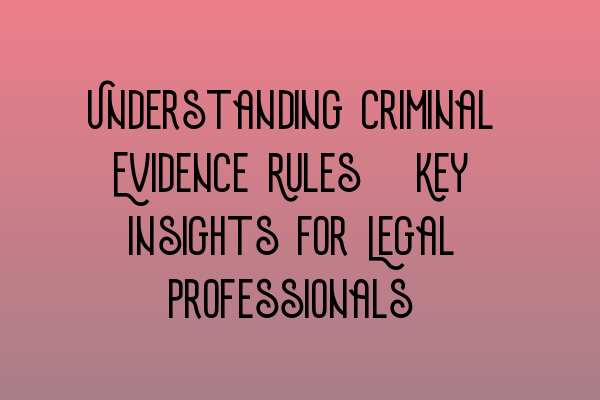Understanding Criminal Evidence Rules: Key Insights for Legal Professionals
Gathering and presenting criminal evidence is a critical aspect of the legal profession. Criminal evidence is essential for establishing guilt or innocence and ensuring a fair trial. As a legal professional, it is vital to have a comprehensive understanding of the evidence rules that govern criminal proceedings.
Importance of Criminal Evidence Rules
Criminal evidence rules serve as a framework within which evidence is collected, preserved, presented, and evaluated in a court of law. These rules ensure that the evidence presented is reliable, relevant, and admissible. Failure to adhere to these rules may result in the exclusion of crucial evidence, potentially jeopardizing the outcome of the case.
Legal professionals must be well-versed in the rules of evidence to effectively represent their clients. Understanding these rules helps to strengthen a case by presenting evidence that meets the required legal standards.
Relevance and Admissibility
Relevance and admissibility are two key considerations when presenting evidence in a criminal trial. Relevance refers to the connection between the evidence and the issues in the case. The evidence must have a logical and authentic connection to the facts in question.
Admissibility relates to the legal requirements that must be met for evidence to be considered by the court. Factors such as authenticity, hearsay, and privilege can impact the admissibility of evidence. It is crucial for legal professionals to fully understand these factors to ensure the evidence they present is admissible.
Presentation of Evidence
Proper presentation of evidence is crucial to ensure its effectiveness and persuasiveness. Legal professionals must meticulously plan the presentation, carefully selecting the most compelling evidence to support their client’s case.
Additionally, understanding how to present evidence in compliance with the relevant criminal evidence rules is essential. This includes knowing how to introduce exhibits, question witnesses, and handle objections from opposing counsel.
Evidence Preservation
Preserving evidence is of utmost importance to maintain its integrity and reliability. Legal professionals must ensure that all evidence is properly collected, stored, and documented to prevent tampering or contamination.
Adhering to the evidence rules is crucial during the collection and preservation process. Failure to follow proper procedures may render the evidence inadmissible, potentially impacting the outcome of the case.
Staying Updated on Criminal Evidence Rules
Legal professionals must stay updated on the latest developments and changes in criminal evidence rules. This ensures that they are fully equipped to navigate the complexities of the legal system and effectively represent their clients.
At SQE Criminal Law & Practice Law UK, we offer comprehensive SQE 1 preparation courses and SQE 2 preparation courses to help legal professionals enhance their knowledge and skills in criminal law. We also provide a wide range of resources, including SQE 1 practice exam questions and SQE 1 practice mocks FLK1 FLK2, to facilitate your learning.
Stay informed about the SRA SQE exam dates and ensure you are well-prepared to excel in your legal career.
With a thorough understanding of criminal evidence rules and continuous professional development, legal professionals can confidently navigate the complexities of criminal law and effectively represent their clients.
